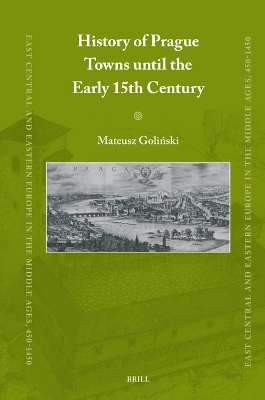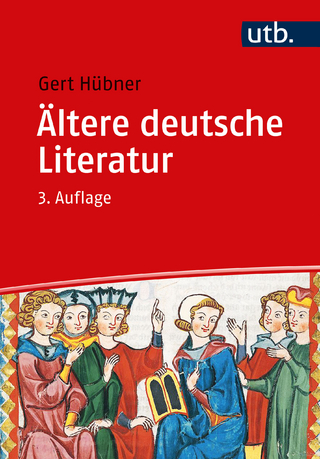
History of Prague Towns until the Early 15th Century
Brill (Verlag)
978-90-04-69458-3 (ISBN)
The aim of this book is to introduce the reader to the organization of medieval Prague up to the early 15th century with a focus on the first two essential phases of agglomeration development: early urban and post-charted. Prague was a so-called “multi-part town”, consisting of several municipalities and separate urban complexes.
This publication examines these Prague towns, their inhabitants, and the institutions that served them, as well as many events and places not connected directly to this book’s “urban” subject but which nevertheless constitute an inseparable background and significantly influenced the whole community of Prague.
Mateusz Goliński, Ph.D. (1989), University of Wrocław, is a professor of medieval history at the same university. He has published monographs, editions of historical sources, and articles on cities, the bourgeoisie, Jews, and militaries in Poland and Bohemia (primarily Silesia) in the 13th to 16th centuries.
Contents
Preface
List of Figures
List of Tables
1 Introduction
1 Location – Settlement Conditions
2 Hinterland
3 Prague Castle (Pražský hrad)
4 Vyšehrad
2 Suburbium
1 Suburban Population – Economic Base of the Castle
2 Prague suburbium and Vyšehrad Settlement – Proto-urban Settlement Clusters
3 Suburbium in the Eyes of Archaeologists
4 Suburbium – Properties of the Duke, Aristocracy and Monasteries
5 Jews in Prague
6 Germans of Prague and Their Settlements
7 Romance-speaking Tradesmen and Settlement
8 Churches in the suburbium
9 Masonry Houses
3 Birth of the City of Prague
1 Beginnings of the Municipal Reforms – Emerging of the Old Town
2 New Monastic Foundations
3 The Issue of Shifting the German Concentration
4 New Town by St. Gall
5 Chronology of the Rise of Commune(s) and Walls vs. the Civil War
6 The Issue of the Possible Unification of Municipalities and the New Town Development
4 Shaping the Specificity of the Old (Greater) Town
1 Changes in the Cultural Landscape
2 The Parish Network – Stability or Change?
3 Parishes and Burghers Aspirations
4 Jewish Quarter
5 A Trade Center between East, West and South in the 13th Century
6 The Law of Visitors and the House of Foreign Merchants
7 Tax Immunities
8 The Mint and the Florentine Capital
9 Debut of the Bourgeoisie in the Political Life of the Country
10 Rule of Law or Law of Retaliation?
11 Municipality and Municipal Bodies
12 The Great Famine
13 Chancellery, Municipal Offices and Services
14 The Prague Law – the Nuremberg Law
5 Beginnings of the New (Lesser) Town
1 New Town Creation
2 Foundations in the New Town
3 Jurisdiction and Selv-government of New Town
6 The Crisis in the System of External Conditions for the Functioning of a Municipal Commune
1 In the Whirlwind of Power Struggles in the Kingdom (1306–1310)
2 Relationship with the Monarch and a Rebellion as an Attempt to Get Back into the Political Game
7 The Formed Old Town Community and Its Problems
1 Religious Tensions
2 The Faithful and the Dispute within the Clergy
3 New Churches and Monasteries
4 Foundations and Burgher Patronage
5 The Ambiguity of John of Luxembourg’s Urban Policy
6 The Town Hall and the Development of Self-government Institutions
7 Sources and Purposes of Funding Self-government
8 Pacification or Disciplining?
9 Commercial Facilities and Order in Urban Spaces
10 Closing the Process of Spatial Transformation of the Old Town
8 Privilege-driven Economy
1 Trade and Craft through the Prism of Statutes and Privileges: The Problem of Guilds and Brotherhoods
2 Staple Right – in the Network of Great Commerce
3 The River vs. Timber Staple Right, Construction Raw Materials
4 Prague’s Trading Partners, Privileges, and Obstacles
9 The New Town
1 Founding of the New Town
2 Implementation of the New Town Plan
3 Charles IV’s Great Foundation Program and Its Successors
4 Councilors and an Attempt to Unite Prague’s Towns
5 Concept of Economic Functions of the New Town
6 Further Trends in the Parceling out of New Town Areas
7 Vyšehrad
10 Left-bank Settlement Complex
1 Lesser Town – Changes in System and Expansion of Jurisdiction
2 Hradčany
3 Suburbia “in the City”
4 The Gothic Castle as a Dominant Landscape Feature
11 External Conditions in the Functioning of the Metropolis
1 Prague Towns in the Political, Legal, and Financial System of the Monarchy
2 Urban Residences of the Ruling Family
3 Nobility in the City
4 Charles Bridge
5 University and Education in the City
6 Church Network and Clergy
12 Urban Community
1 Rural and Migratory Backgrounds: Characteristics of a Metropolitan Community
2 Land Ownership vs. Patrician Identity, Ambitions beyond the State
3 Decline in Christian-Jewish Relations
4 Between Old and New Piety
5 Homes and Rentals
6 Quarter Division and Military Organization of the Greater Town
7 Endless Ordering Efforts
13 Processes of Change
1 From Jerusalem to Bethlehem – the New Piety and Radical Preachers
2 Bohemianization
3 Evolution of the Municipal Government System and the Practice of Its Operation
4 Prague’s Scenery of the Crises of Wenceslas IV’s Reign
5 The Decree of Kutná Hora
Conclusion
Bibliographic Abbreviations
Bibliography
Index of Persons
Index of Places
| Erscheinungsdatum | 12.03.2024 |
|---|---|
| Reihe/Serie | East Central and Eastern Europe in the Middle Ages, 450-1450 ; 92 |
| Verlagsort | Leiden |
| Sprache | englisch |
| Maße | 155 x 235 mm |
| Gewicht | 877 g |
| Themenwelt | Geschichte ► Allgemeine Geschichte ► Mittelalter |
| ISBN-10 | 90-04-69458-7 / 9004694587 |
| ISBN-13 | 978-90-04-69458-3 / 9789004694583 |
| Zustand | Neuware |
| Haben Sie eine Frage zum Produkt? |
aus dem Bereich


